
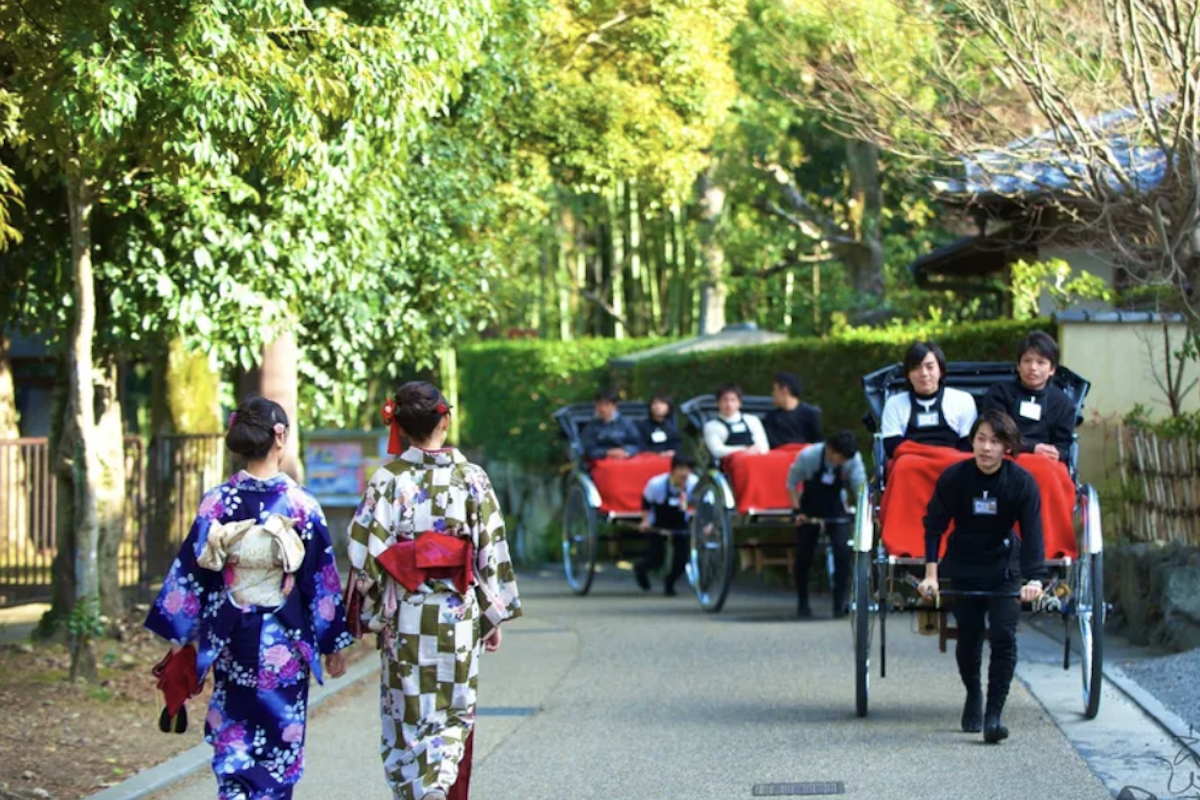
Asakusa is one of the best places in Tokyo to experience Japan’s rich culture and history. From the famous Senso-ji Temple to lively streets filled with shops and street food, this area has something special for everyone. It’s not just about the well-known spots—Asakusa is full of unique experiences that let you connect with Japan’s traditions in fun and interesting ways.
In this guide, you’ll find 20 ways to explore Asakusa, from trying local snacks to joining a tea ceremony or taking a river cruise. Whether you’re here for a day or longer, these ideas will help you make the most of your visit.
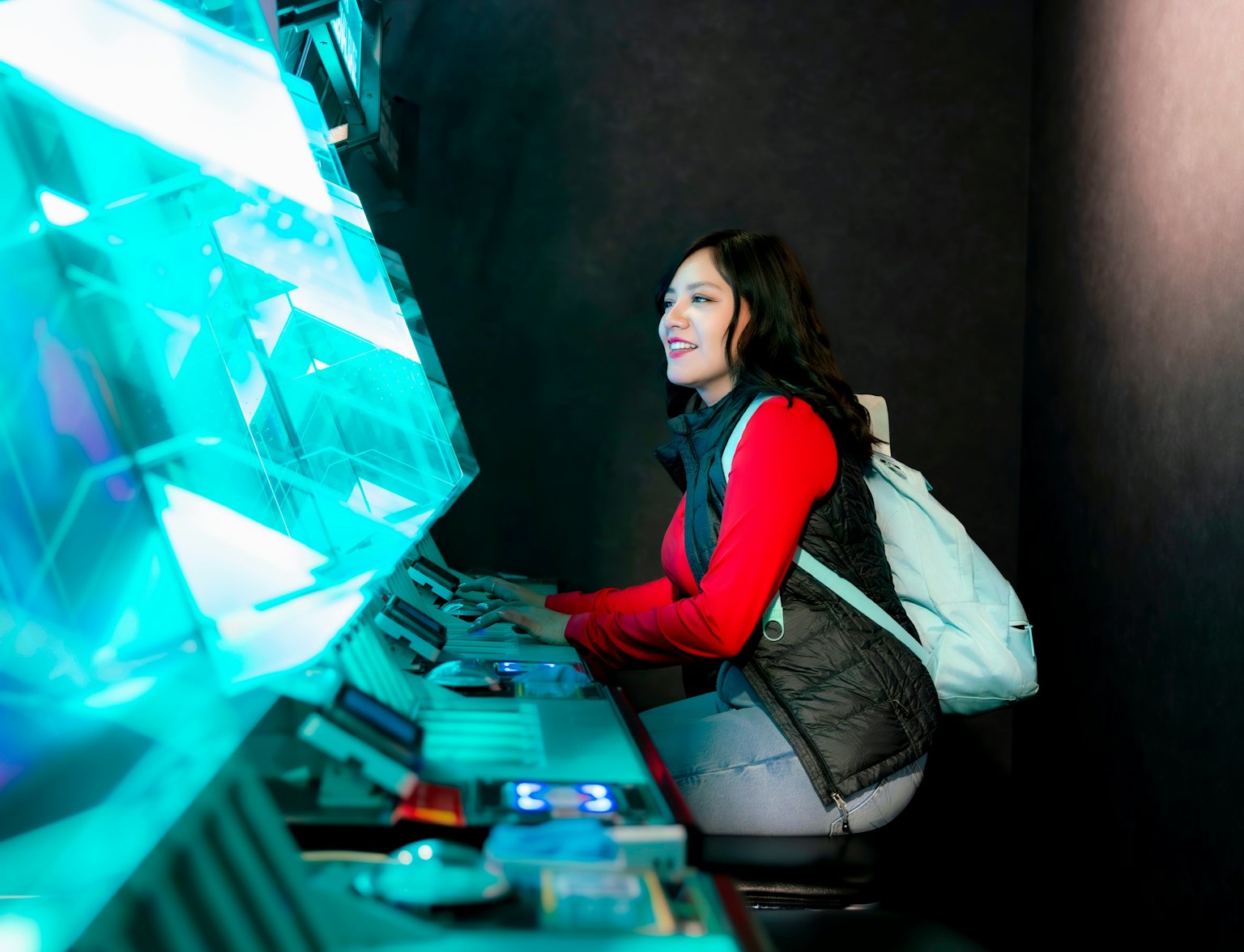
Experience Tokyo’s highlights in just five hours with an English-speaking guide.
Senso-ji Temple is Tokyo's oldest and most significant Buddhist temple, attracting millions of visitors annually. Dedicated to Kannon, the Buddhist goddess of mercy, the temple is a cornerstone of Japanese cultural and spiritual life.
Its Kaminarimon Gate, with its towering red lantern, serves as a grand entry point, symbolizing the fusion of tradition and reverence. The temple complex is rich with intricate details, from the pagodas to the vibrant carvings and murals that reflect Japan’s artistic heritage.
To fully enjoy your visit, consider arriving early in the morning or later in the evening when the temple grounds are less crowded. Participate in traditional rituals like wafting incense smoke over yourself for blessings or drawing an Omikuji fortune slip to learn what the future holds.
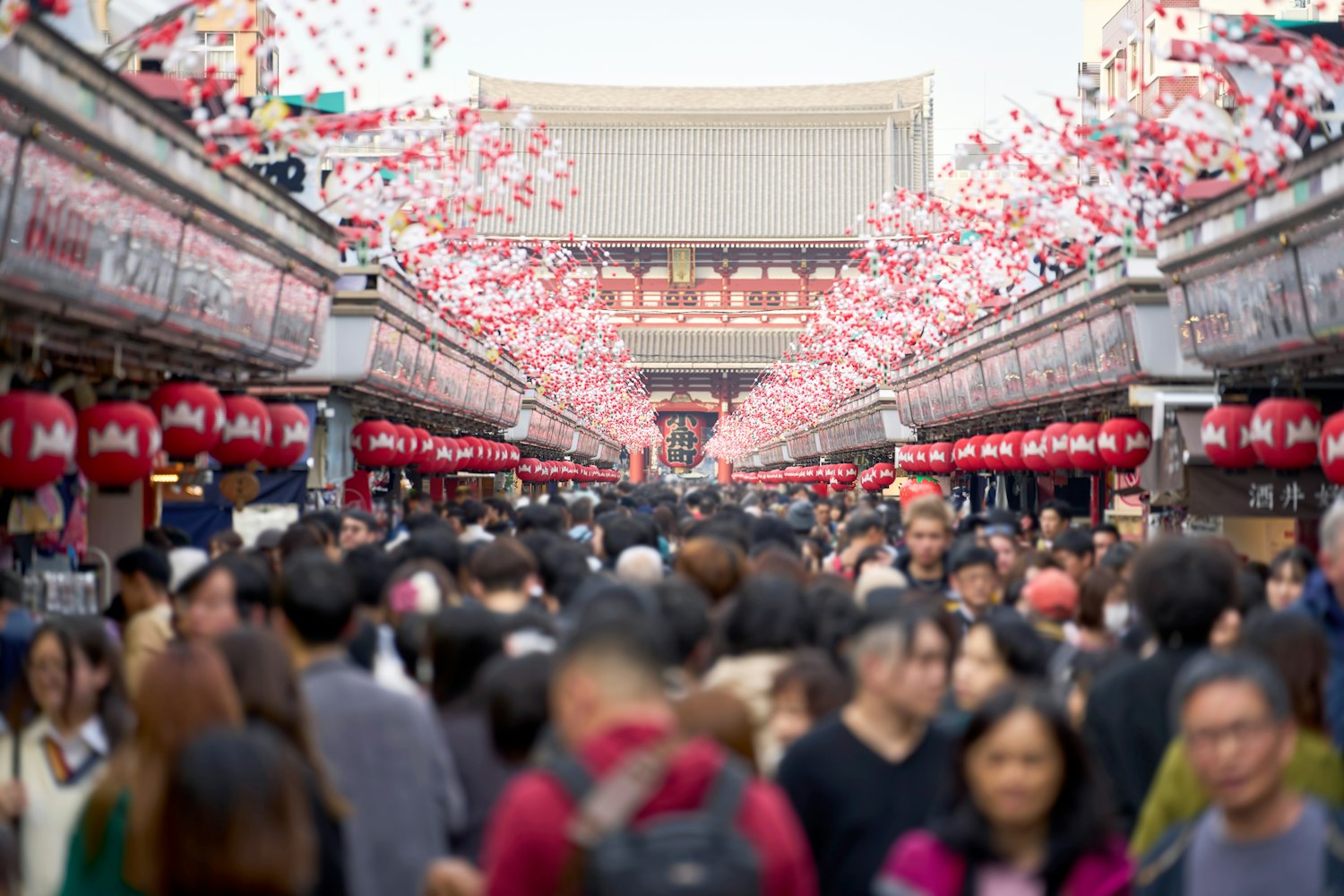
Nakamise Shopping Street is not just a pathway to Senso-ji Temple but an experience steeped in over 300 years of history. This bustling street is lined with nearly 90 stalls offering everything from traditional snacks to handcrafted souvenirs. The architecture of the shops, with their classic wooden exteriors and colorful signs, gives a nostalgic glimpse into Edo-period Japan.
Food lovers can indulge in specialties like ningyo-yaki, small cakes filled with sweet bean paste, and freshly grilled senbei rice crackers. For unique keepsakes, stalls sell items such as folding fans, traditional dolls, and yukata fabrics.
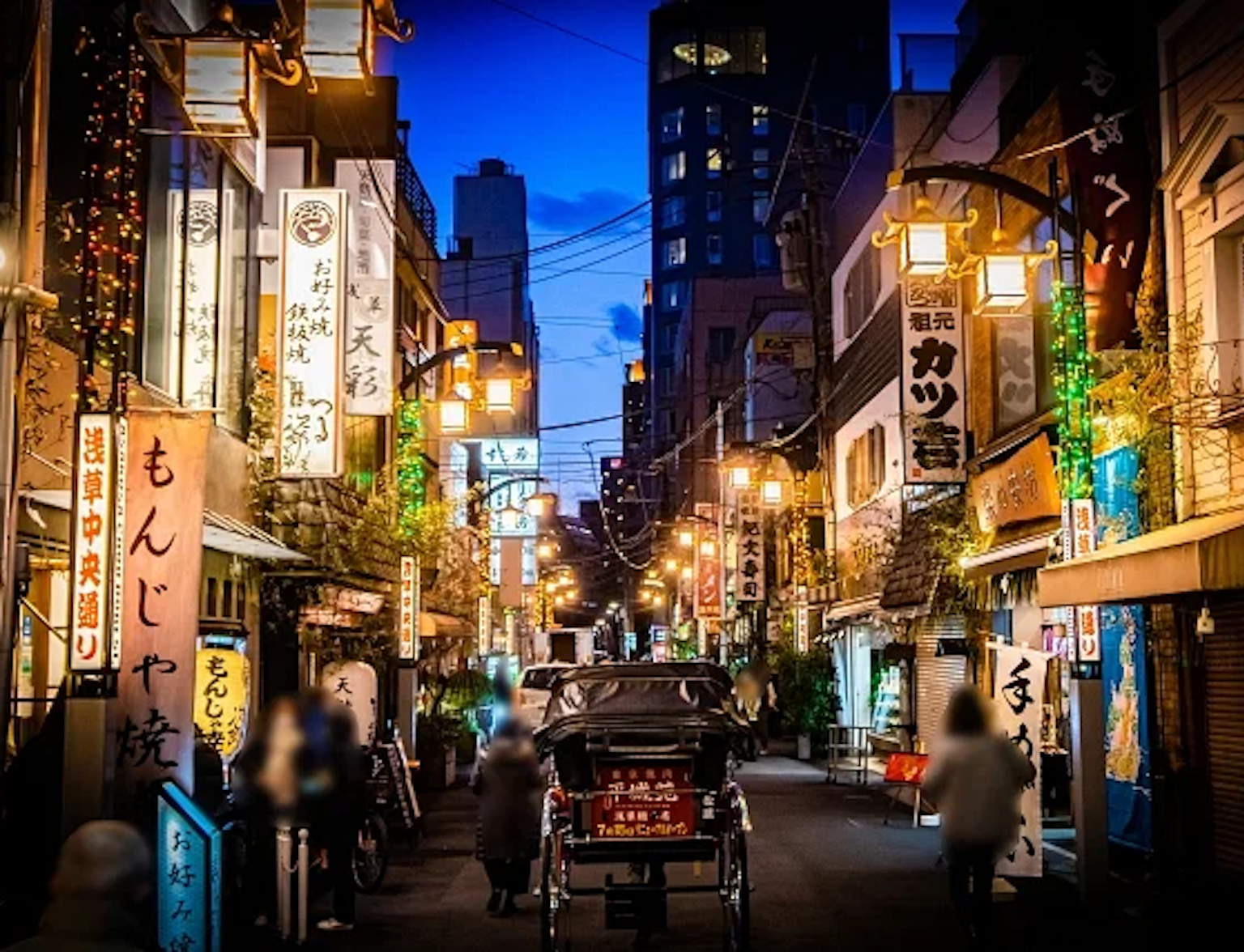
Embark on a journey through Tokyo's iconic neighborhoods with our Asakusa rickshaw tour.
A rickshaw ride in Asakusa offers a blend of comfort, tradition, and storytelling, making it a memorable way to explore the area. Rickshaw drivers, often dressed in traditional attire, are not just transportation guides—they share detailed histories and anecdotes about the neighborhood as you glide through its streets.
Routes typically include landmarks such as the Sumida River, where you can enjoy views of the Tokyo Skytree, and quieter areas like the backstreets of Asakusa, where time seems to stand still. For a more romantic or scenic experience, evening rides showcase Asakusa under the glow of streetlights and temple illuminations. A rickshaw ride is perfect for soaking in the atmosphere while learning more about the area’s deep cultural roots.
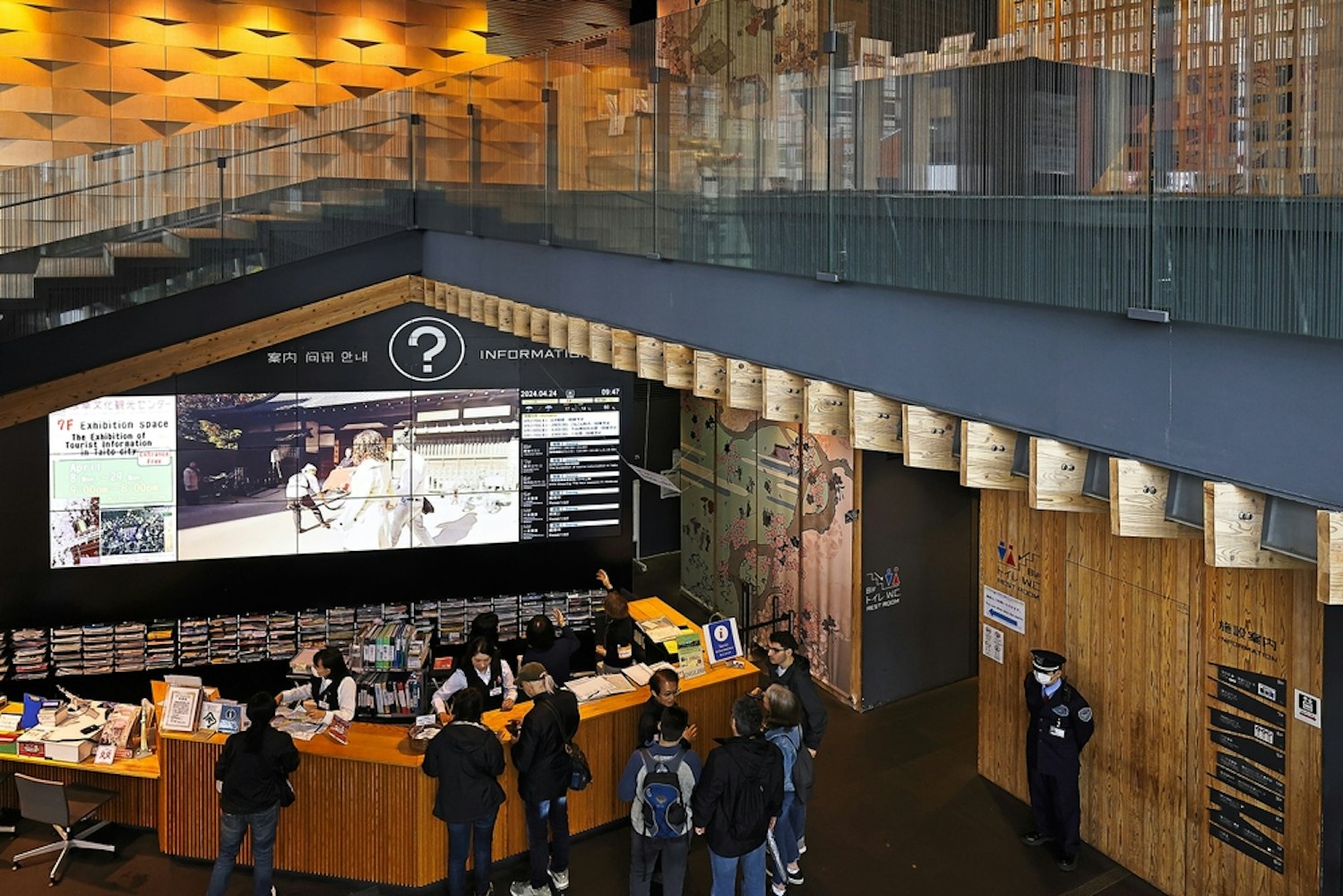
Designed by acclaimed architect Kengo Kuma, the Asakusa Culture and Tourist Information Center is more than a place for maps and brochures. This modern, multi-story building combines traditional Japanese design with urban aesthetics, making it a sight worth visiting on its own. The exhibits provide a comprehensive overview of Asakusa’s history, culture, and traditions, giving visitors a richer context for their exploration.
The building's rooftop observation deck is a highlight, offering panoramic views of Asakusa, Senso-ji Temple, the Sumida River, and the Tokyo Skytree. For those needing a break, the café on the upper floor is a relaxing spot to enjoy refreshments while soaking in the scenery.
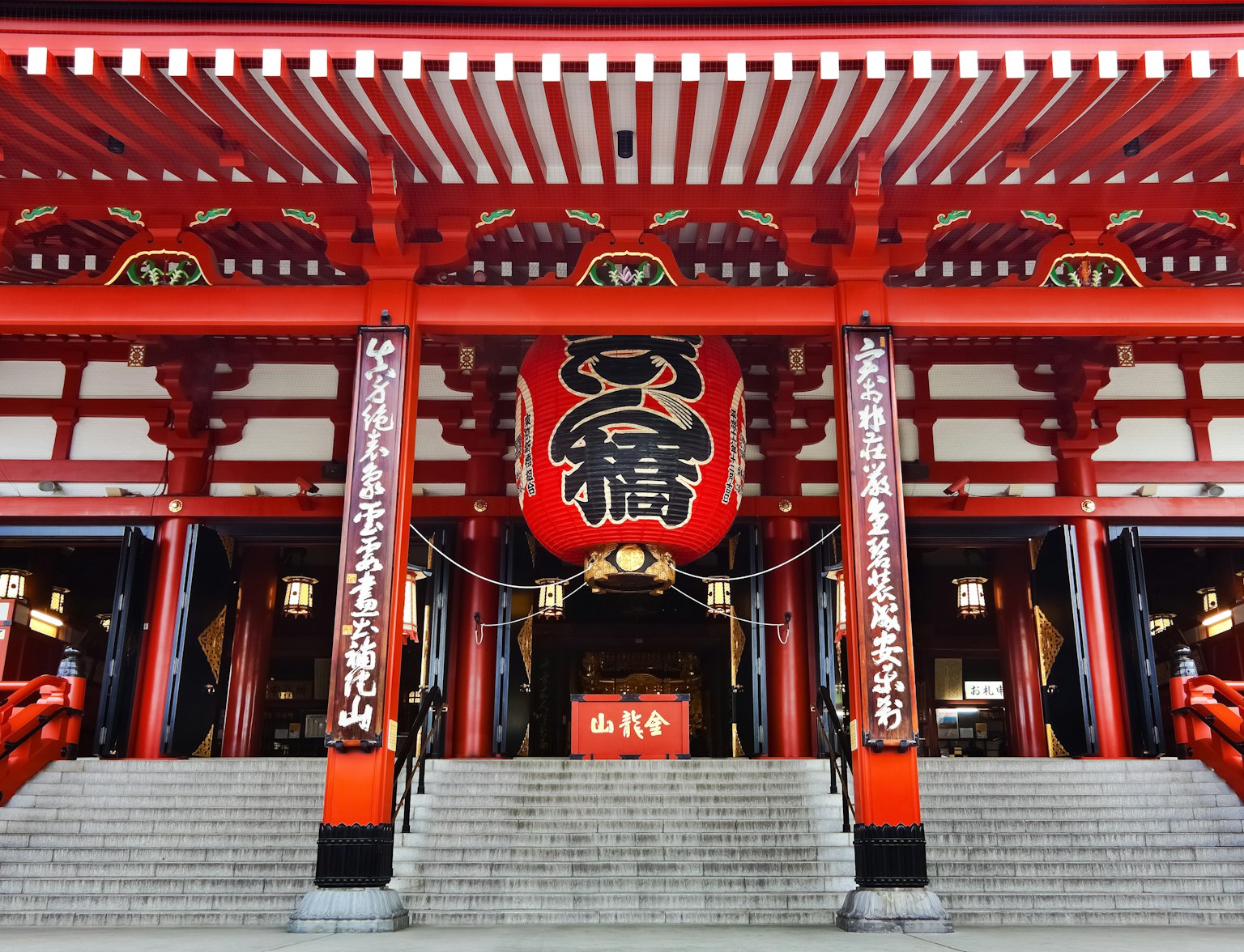
Embark on a history walking tour in Asakusa to dive deep into Tokyo's rich past and vibrant culture.
While Senso-ji takes the spotlight, Asakusa is home to several smaller, hidden temples that offer a quieter, more personal connection to Japan’s spiritual traditions. Matsuchiyama Shoden, for example, is a peaceful sanctuary dedicated to Daikokuten, the god of wealth and good fortune. Nestled on a small hill overlooking the Sumida River, it features radish-shaped offerings symbolizing health and prosperity.
These lesser-known temples often provide unique rituals, architectural details, and serene surroundings that contrast with the lively atmosphere of Senso-ji. Exploring these hidden gems allows visitors to experience Asakusa’s spiritual heritage more intimately.
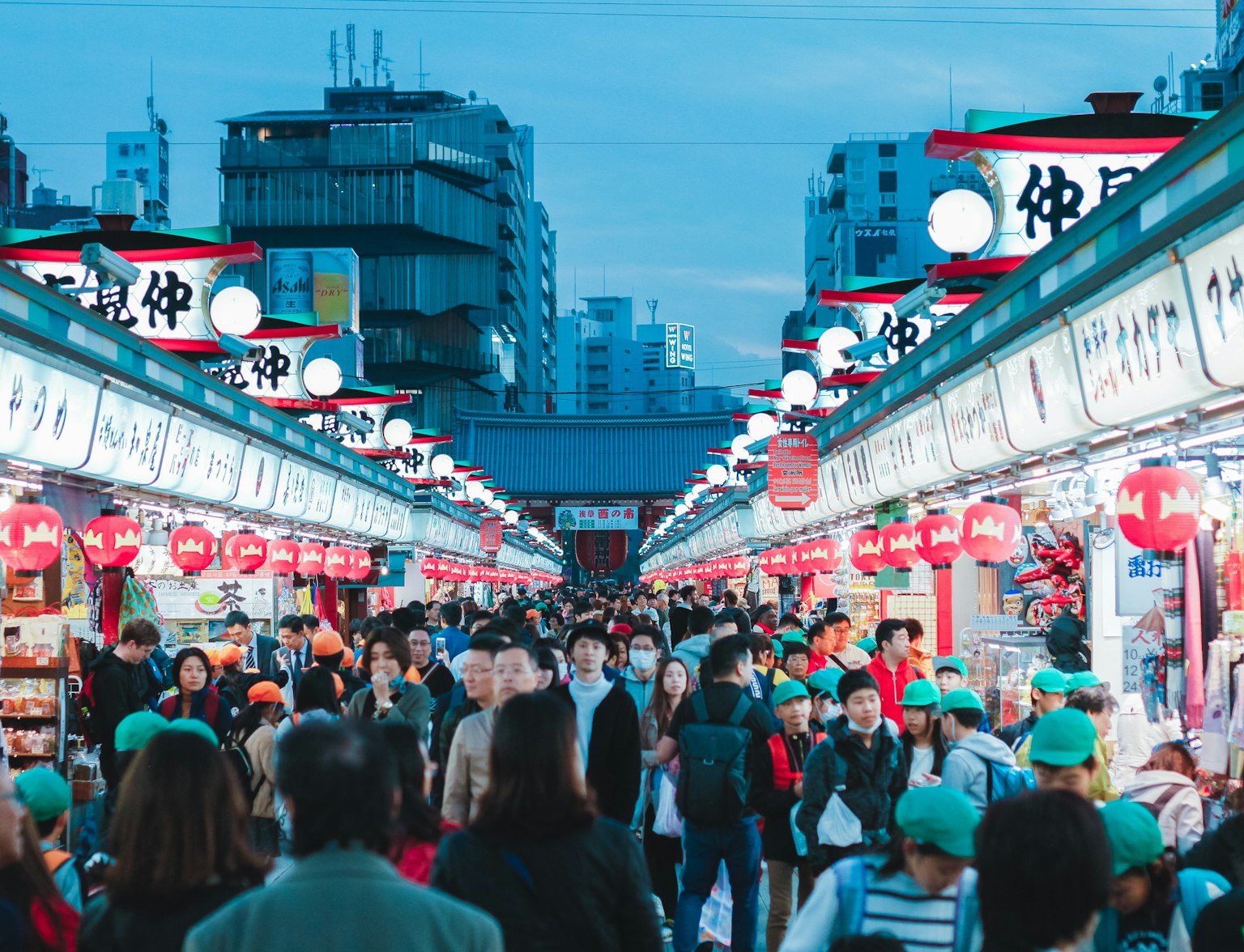
Discover the true heart of Tokyo on our 2-hour Asakusa Food Hunt Cultural Tour.
Asakusa is a paradise for street food lovers, offering a variety of traditional snacks that reflect Japan’s culinary heritage. Ningyo-yaki, small cakes shaped like dolls and filled with sweet red bean paste, are a local favorite and often freshly-made at stalls along Nakamise Street. Melon pan, a sweet bread with a crispy, sugary crust, is another must-try and can be found at several popular bakeries in the area, some even serving it warm with ice cream.
For a savory option, try freshly grilled senbei rice crackers or yakitori skewers from local vendors. Asakusa’s bustling market streets are filled with stalls offering these treats, and the aromas alone will tempt you to try more than a few.
Among the standout locations is Kagetsudo, famous for its jumbo melon pan, and Asakusa’s age-old ningyo-yaki stalls near Senso-ji, which have been serving visitors for decades.
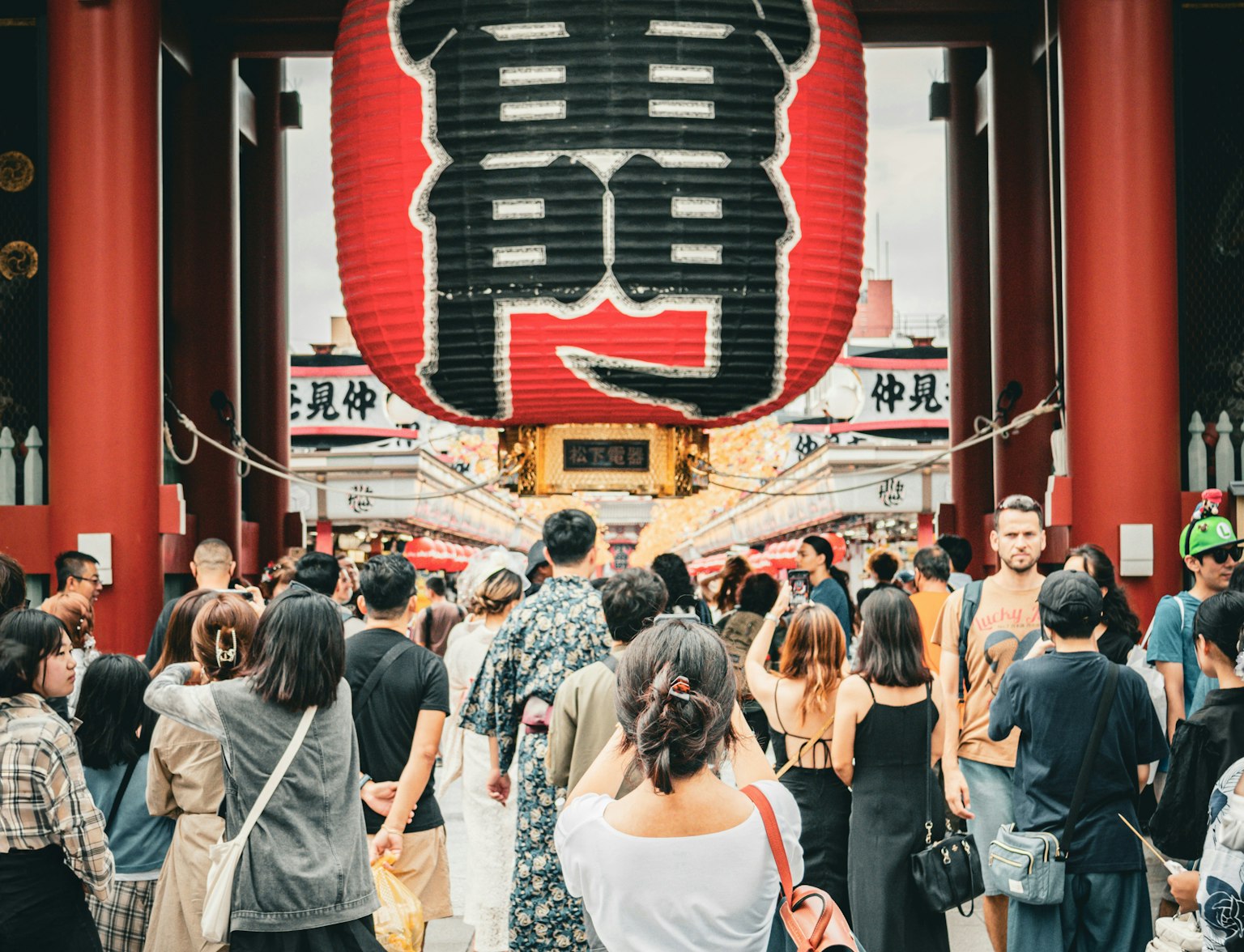
Discover the heart of Asakusa on this 3-hour cultural walk and matcha-making tour.
Participating in a tea ceremony in Asakusa is a tranquil way to connect with Japanese culture. These ceremonies are more than just about drinking tea; they represent harmony, respect, and mindfulness, deeply rooted in tradition. Experienced hosts guide you through the preparation and serving of matcha (powdered green tea) in a serene setting, explaining the rituals and meanings behind each step.
Asakusa offers several tea houses where you can experience this practice. One recommended spot is the Asakusa Chazen, which provides an authentic yet welcoming environment for beginners. Another option is Nadeshiko, known for its intimate and beautifully decorated space.
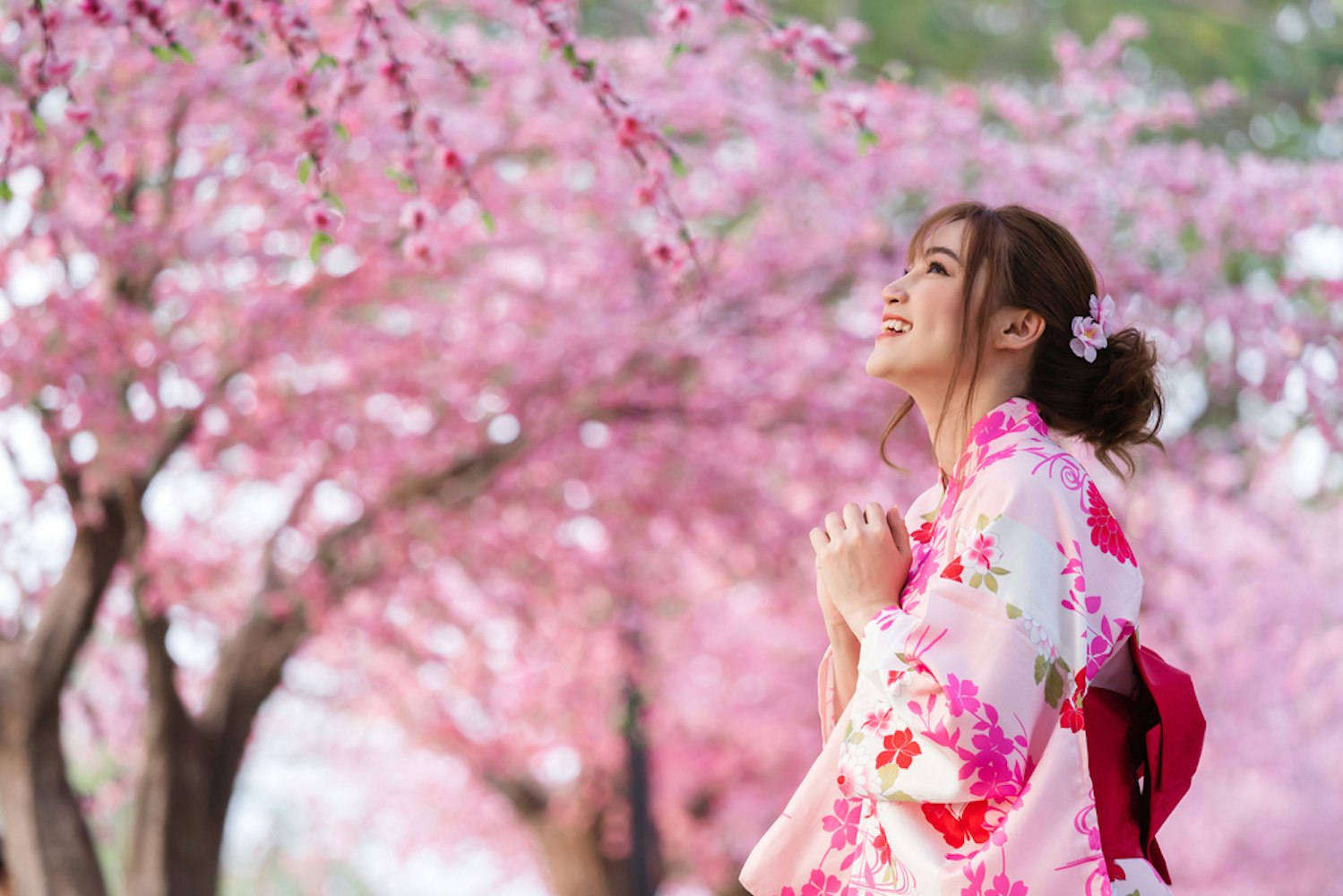
Wearing a traditional yukata or kimono while exploring Asakusa adds a special touch to your visit. These elegant garments, available in a range of colors and patterns, provide a unique opportunity to immerse yourself in Japanese culture. Rental shops in Asakusa not only offer a variety of styles but also assist with dressing, ensuring everything is worn correctly.
Some of the best rental shops include Vasara and Kyoto Kimono Rental Wargo, both known for their quality attire and convenient locations near Senso-ji Temple. Strolling through Asakusa in traditional attire enhances your experience and creates wonderful photo opportunities, especially in iconic spots like Nakamise Street or the Sumida River.
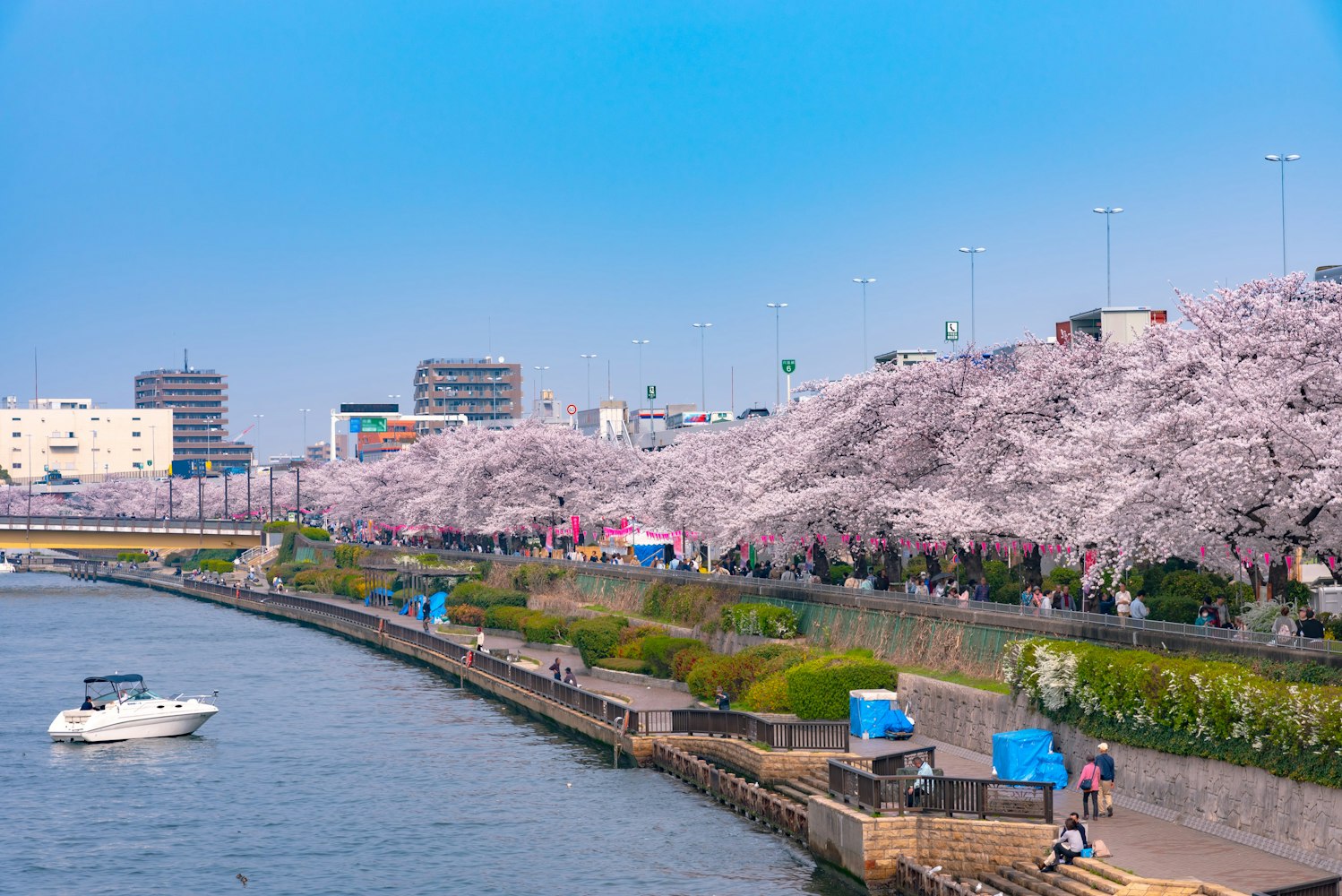
The Sumida River has long been an important feature of Tokyo, offering both historical significance and natural beauty. Walking along the river provides scenic views of landmarks like the Tokyo Skytree and the Asahi Beer Tower. Sumida Park, which runs alongside the river, is a peaceful retreat where visitors can relax and enjoy seasonal highlights such as cherry blossoms in spring.
The park is also a venue for popular events, including the Sumida River Fireworks Festival in summer, which draws large crowds. For a different perspective, consider taking a leisurely river cruise. Traditional yakatabune boats or modern ferries offer views of Tokyo’s skyline while highlighting Asakusa’s waterfront charm.
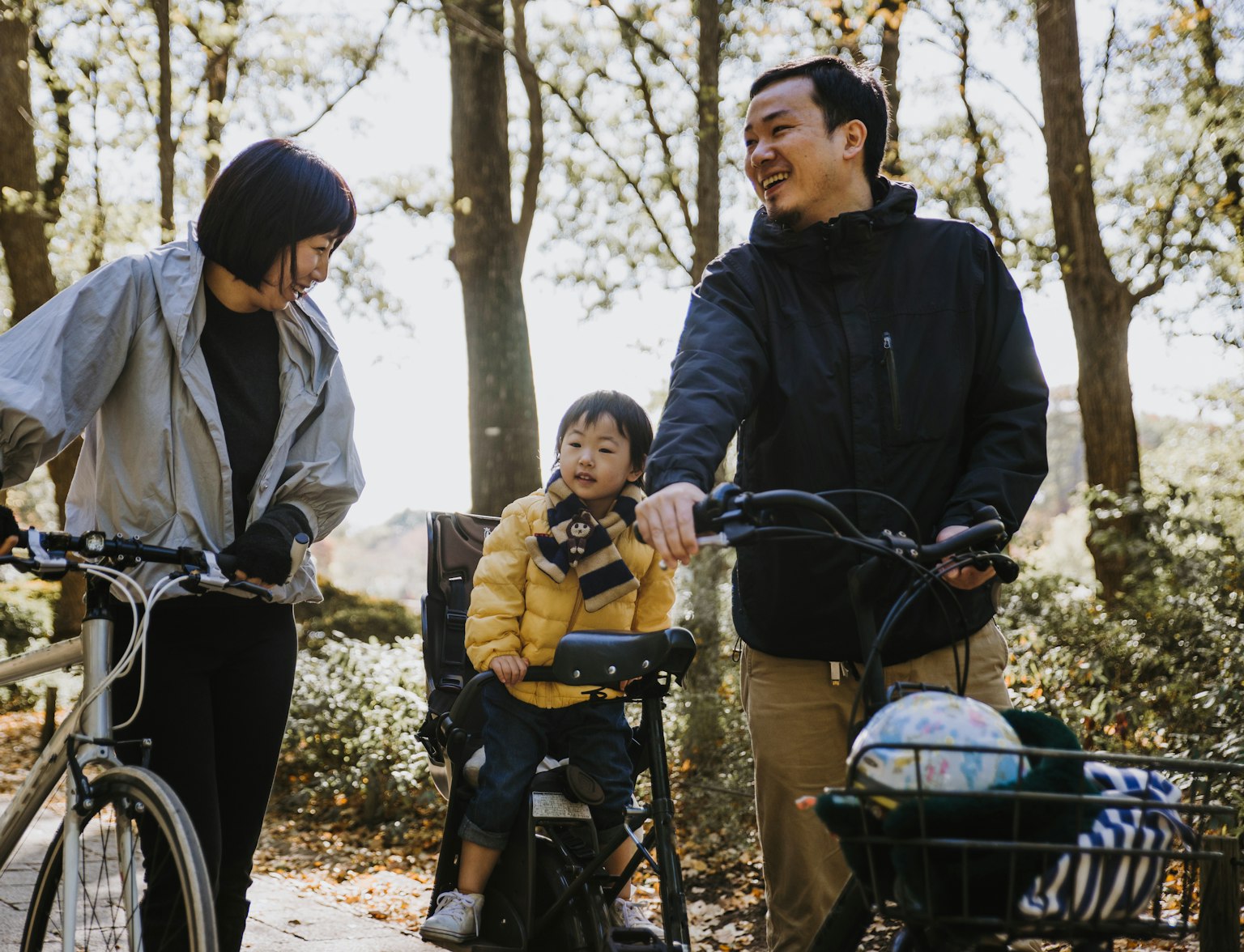
Dive into Tokyo's local culture with a 5-hour bike tour.
The Edo Taito Traditional Crafts Center is a hidden gem in Asakusa, showcasing the region’s craftsmanship and cultural heritage. The center features exhibits on traditional crafts such as Edo Kiriko (cut glass), folding fans, and woodblock prints. These crafts, some of which date back centuries, are still produced by skilled artisans today.
What sets the center apart is the opportunity to join hands-on workshops, where visitors can try their hand at making items like paper fans or decorative glassware. It’s a unique experience that not only allows you to create a memorable souvenir but also deepens your appreciation for the skills and dedication behind these traditional crafts.
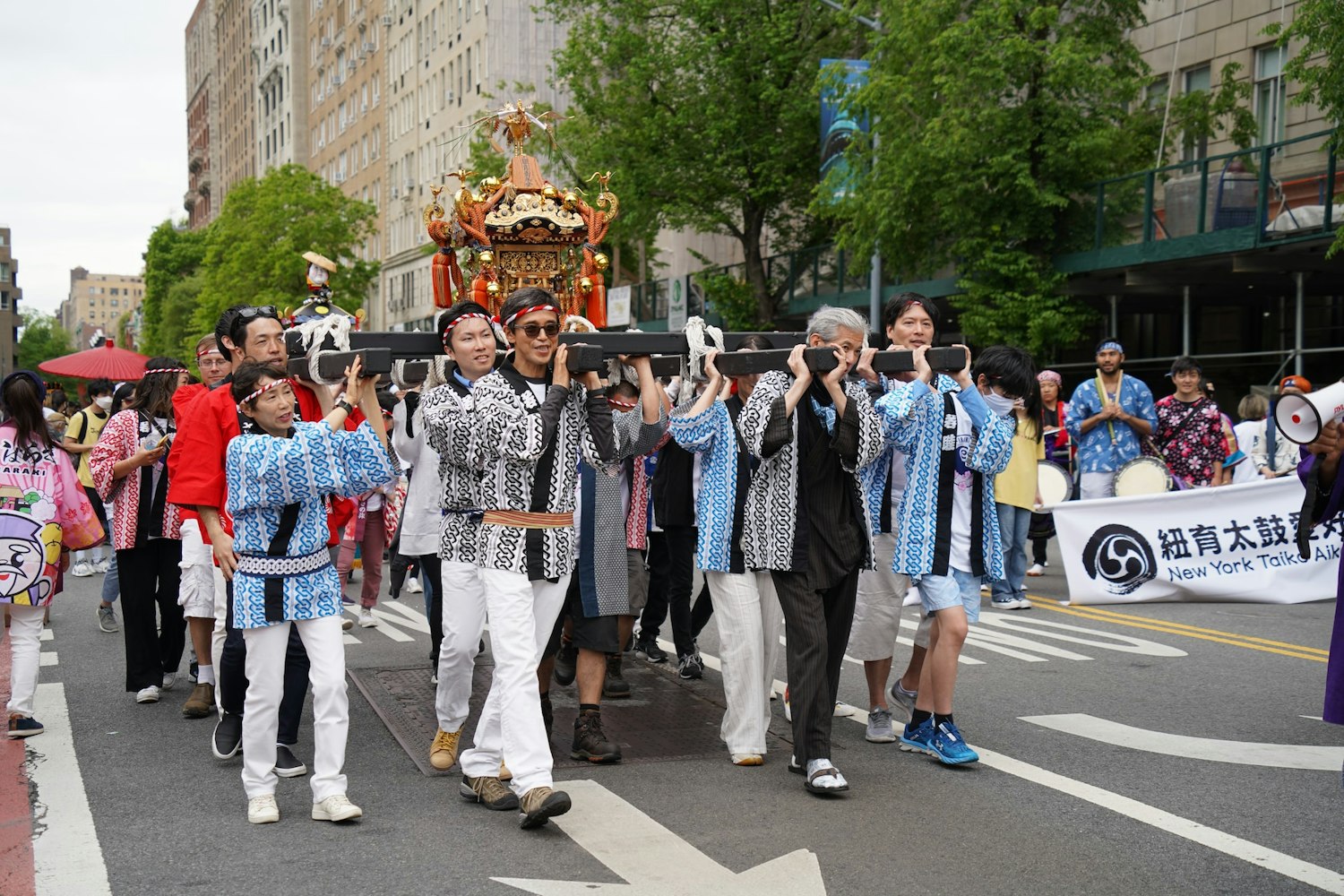
The Sanja Matsuri is one of Tokyo's most vibrant and significant festivals, held annually in May to honor the founders of Senso-ji Temple. This three-day event transforms Asakusa into a lively celebration of tradition and community spirit. The highlight is the procession of portable shrines (mikoshi), where teams of locals carry intricately decorated shrines through the streets to bring blessings to the neighborhood.
In addition to the mikoshi parade, the festival features traditional music, energetic taiko drum performances, and dances that fill the streets with life. Visitors can immerse themselves in the energy, witnessing age-old customs up close.
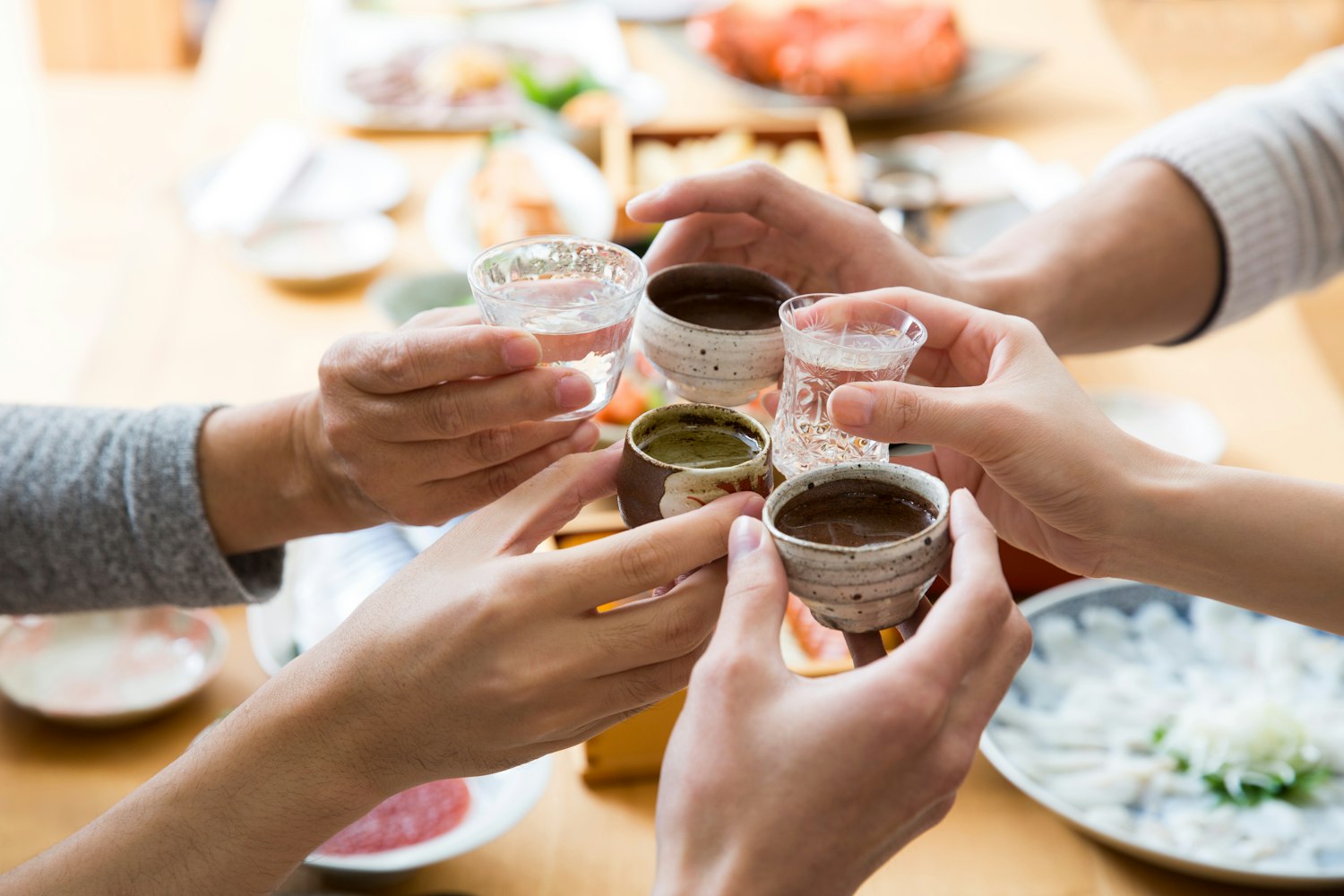
Asakusa is an excellent place to explore the world of Japanese sake. The area is home to various bars and breweries that offer sake-tasting experiences, showcasing the drink’s deep connection to Japanese culture. Sake in Asakusa ranges from smooth, fruity varieties to full-bodied brews, giving visitors a chance to discover the drink’s diverse flavors.
One popular spot is Kamiya Bar, one of Tokyo’s oldest bars, known for its wide selection of sake and other traditional drinks. Another notable location is Asakusa Hoppy Street, where local izakayas serve sake alongside delicious street food.
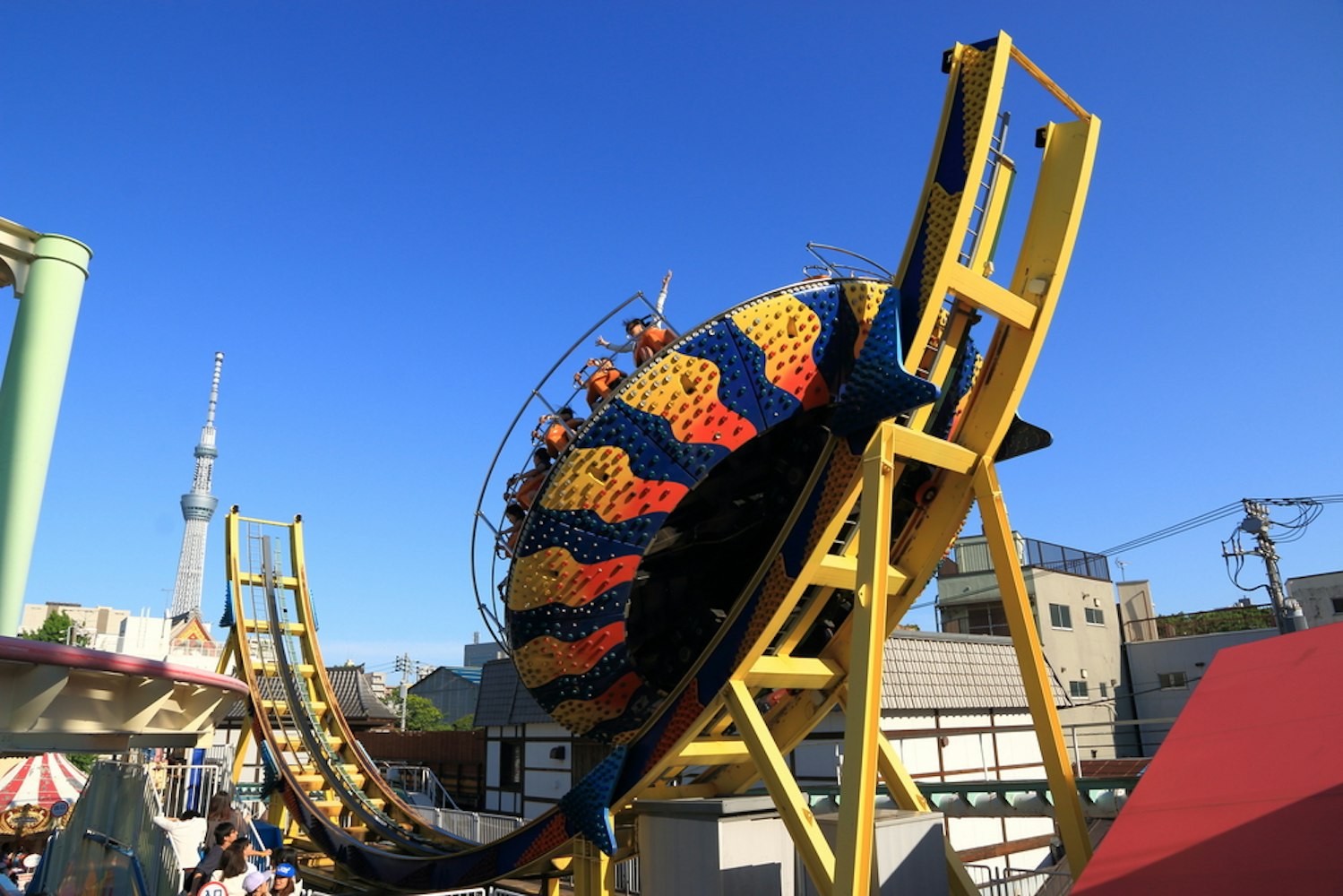
Asakusa Hanayashiki is Japan’s oldest amusement park, dating back to 1853. Despite its compact size, the park is packed with retro charm and family-friendly attractions. Visitors can enjoy classic rides like the Flower Ferris Wheel and Japan’s oldest roller coaster, which has been thrilling guests since 1953.
The park also blends traditional Japanese aesthetics with its playful atmosphere, featuring cultural performances and themed areas that reflect Asakusa’s heritage. Whether you're visiting with kids or looking to revisit childhood nostalgia, Hanayashiki offers a delightful mix of entertainment and history.
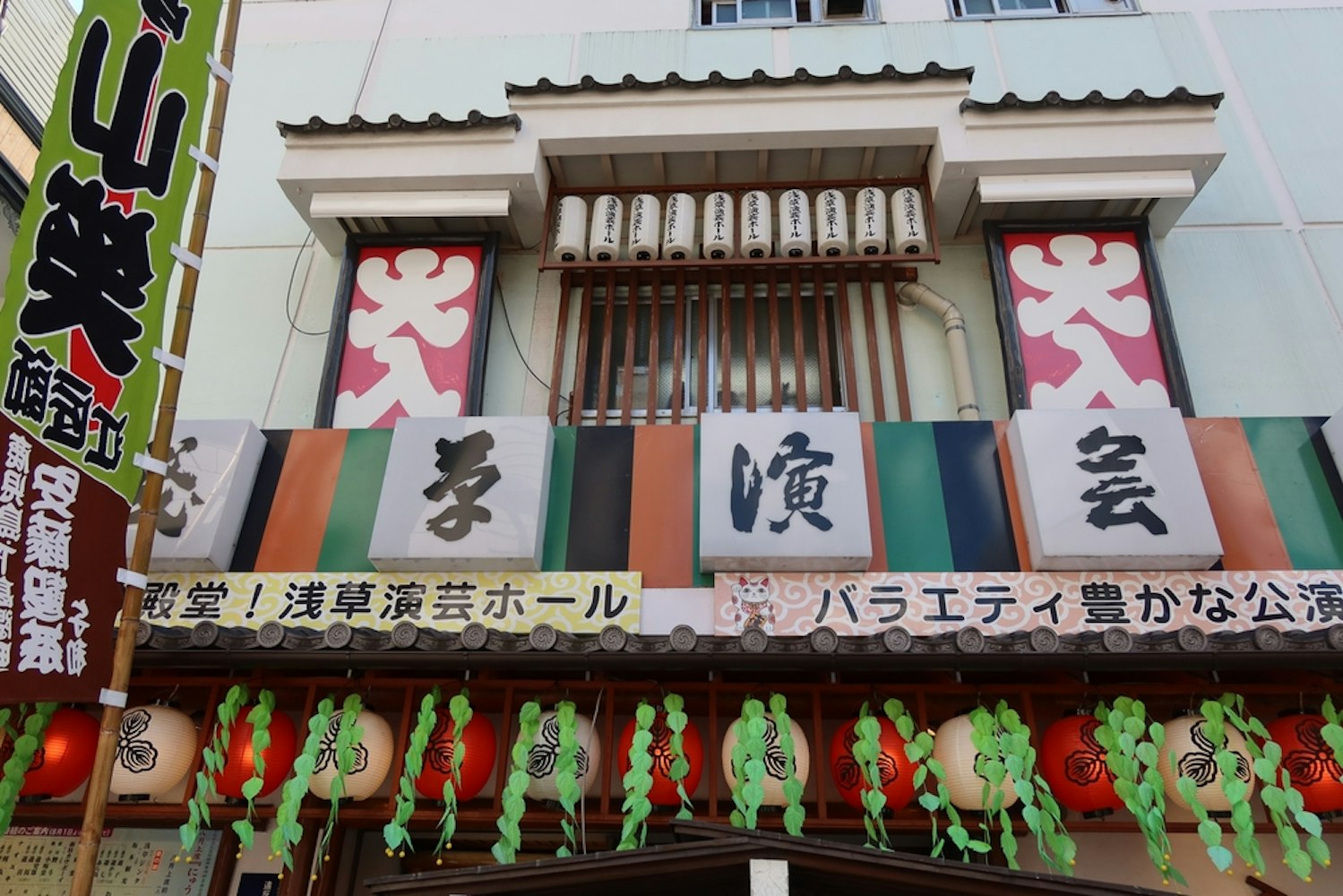
Asakusa has long been a hub for traditional Japanese performing arts, and venues like the Asakusa Engei Hall keep these traditions alive. This theater is renowned for hosting rakugo, a form of comedic storytelling where performers captivate audiences with clever narratives and minimal props.
The Engei Hall also features manzai (stand-up comedy duos), magic shows, and other performances that offer a glimpse into Japan’s theatrical culture. Visiting these theaters provides an intimate and entertaining experience that connects you to the humor and artistry of Japanese traditions.
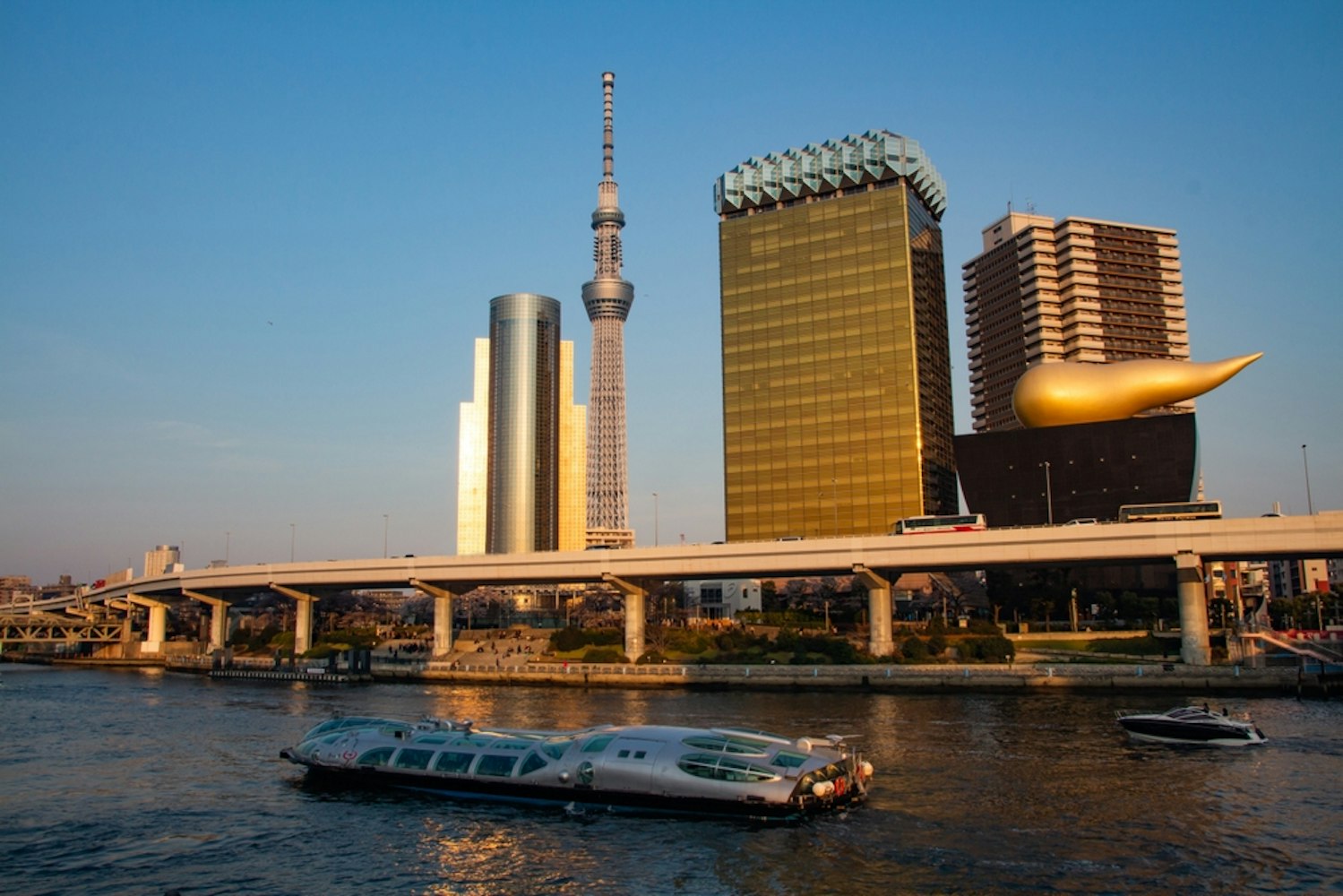
A cruise along the Sumida River is a relaxing way to experience Asakusa from a different perspective. The river offers stunning views of iconic landmarks like the Tokyo Skytree and the Asahi Beer Tower, as well as bridges that showcase a variety of architectural styles.
Cruises range from traditional yakatabune boats, where you can enjoy meals on board, to modern ferries with panoramic decks. Some tours even include evening options, allowing you to admire the city’s illuminated skyline. Whether you’re looking for a romantic outing or a peaceful escape, a Sumida River cruise is a highlight of any Asakusa visit.
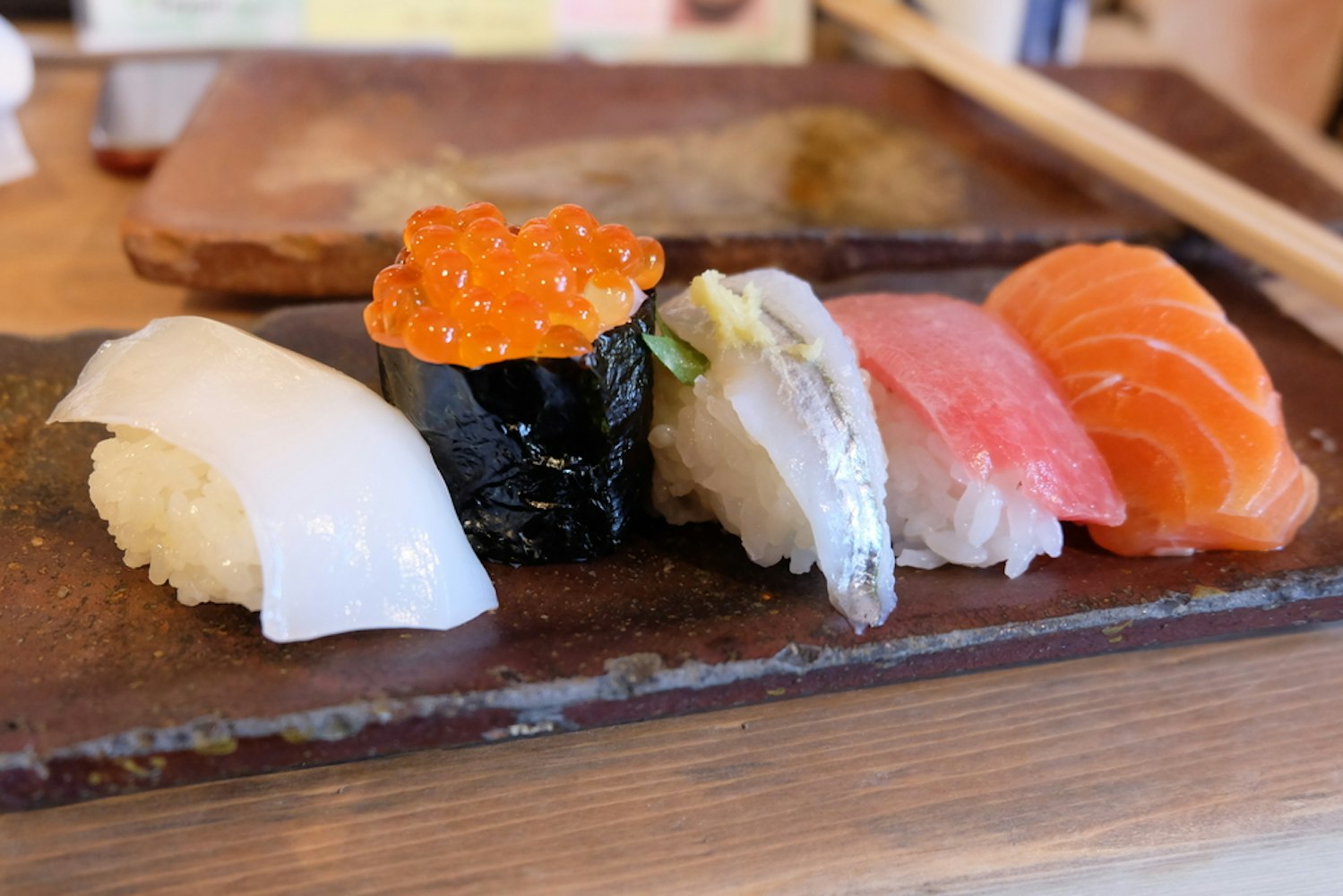
Asakusa is a haven for traditional Japanese cuisine, with restaurants that have been serving authentic dishes for generations. The area is particularly known for its unagi (grilled eel), tempura, and sushi, which reflect the simplicity and precision of Japanese culinary traditions. Long-established eateries, often tucked away in historic buildings, offer a dining experience that connects you to the past.
One standout spot is Asakusa Mugitoro, renowned for its Tororo (grated yam) dishes and elegant ambiance. For tempura lovers, Daikokuya Tempura has been a local favorite since the late 1800s, serving golden, crispy tempura alongside steaming bowls of rice. Sushi enthusiasts should visit Sushi Zanmai, known for its fresh and affordable offerings. Dining in these establishments is not just about the food—it’s an opportunity to immerse yourself in Asakusa’s rich culinary heritage.
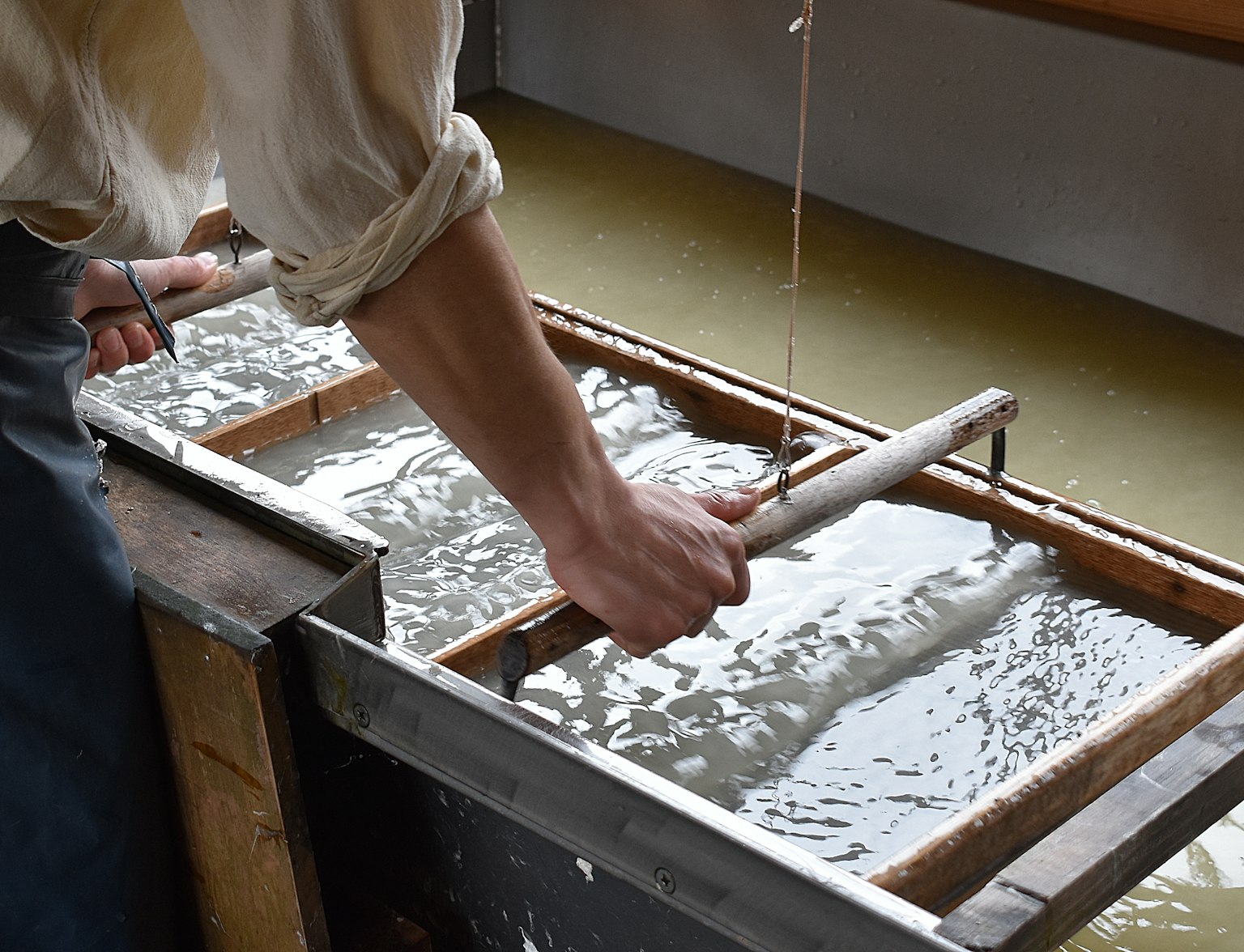
Experience the art of Tosa Washi papermaking in Asakusa.
Asakusa’s artisan shops are a treasure trove of handmade goods that showcase Japan’s craftsmanship and attention to detail. From washi paper to tabi socks, these items are perfect for those seeking authentic souvenirs or gifts. Many of these shops have been family-run for generations, preserving traditional techniques and designs.
Recommended stores include Echigoya, specializing in beautifully crafted tabi socks, and Kamikawaguchi-ya, known for its intricate washi paper. Another notable destination is the Edo Shikki shop, offering lacquerware with exquisite patterns. Shopping in Asakusa isn’t just about buying—it’s about experiencing the dedication and artistry behind these creations.
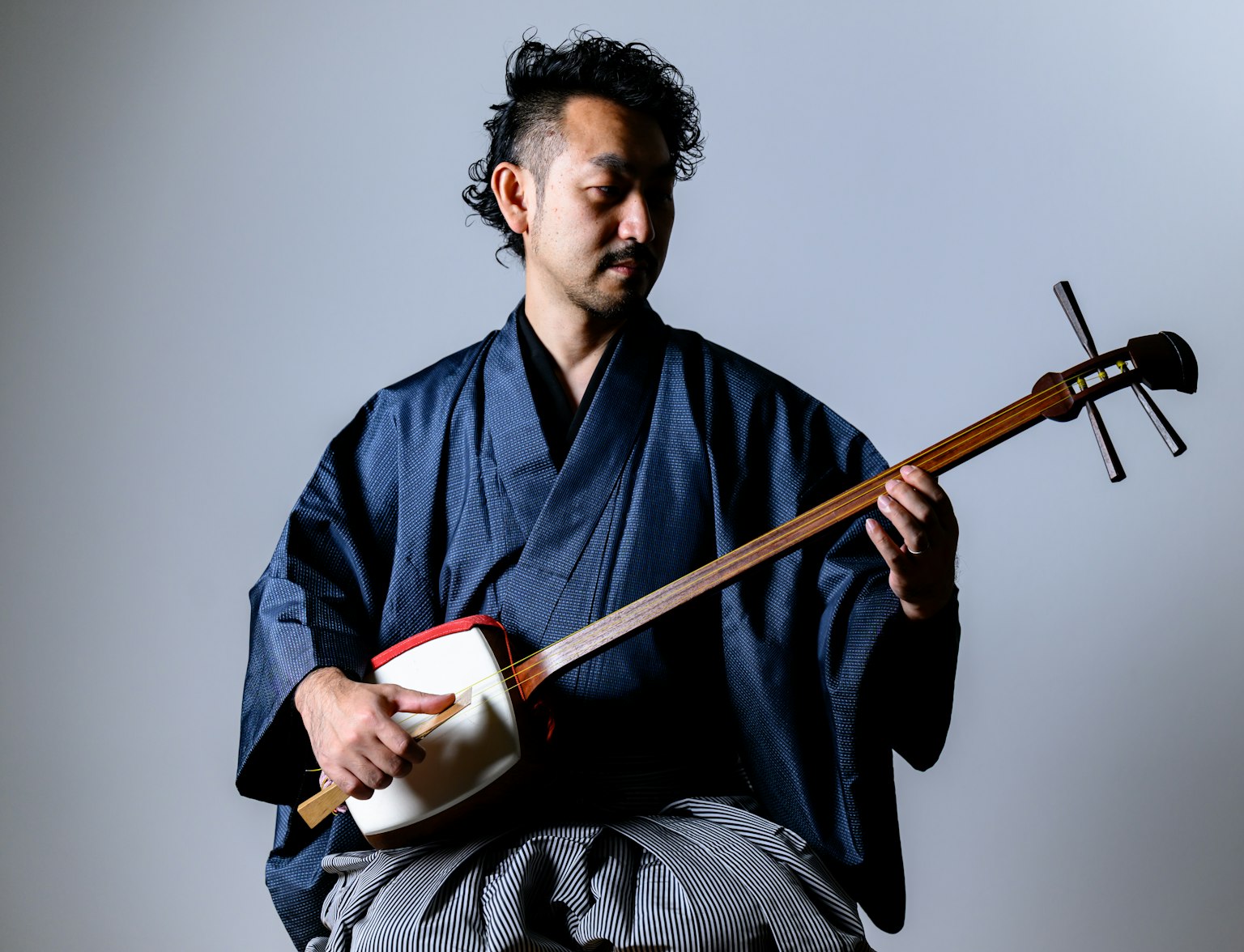
Immerse yourself in the resonant world of traditional Japanese music.
For a hands-on cultural experience, Asakusa offers workshops that allow visitors to learn traditional crafts such as calligraphy, woodblock printing, and wagashi-making (Japanese sweets). These activities provide a deeper appreciation for Japanese artistry while giving you the chance to create something memorable to take home.
One popular workshop is held at Mokuhankan, where you can learn the intricate art of woodblock printing. For culinary enthusiasts, wagashi-making classes introduce the delicate techniques behind crafting traditional sweets. Participating in these workshops is not only educational but also a meaningful way to connect with Japan’s cultural traditions.
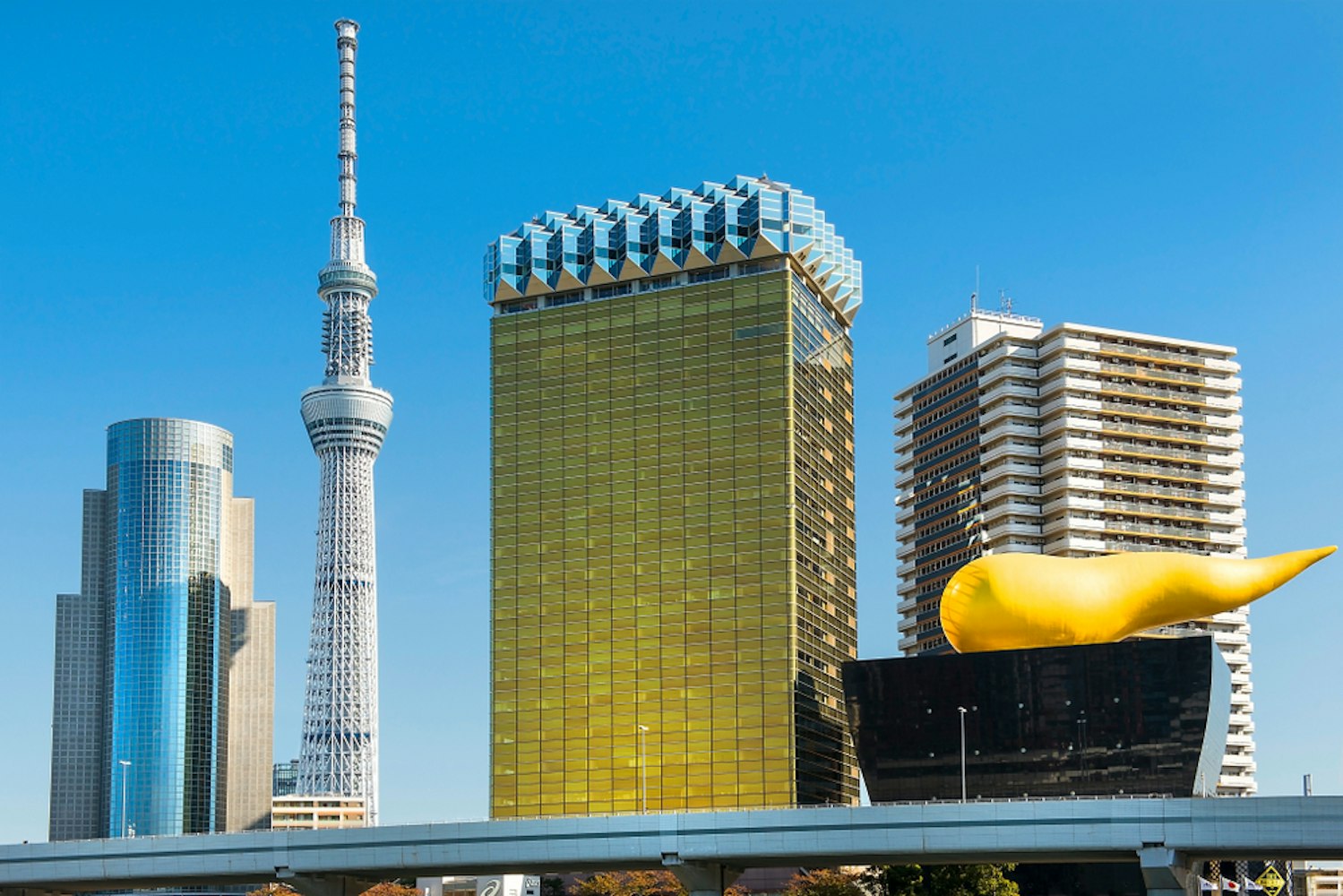
The Asahi Beer Tower is an iconic part of Asakusa’s skyline, easily recognizable by its golden flame-shaped sculpture known as the Asahi Flame. This modern architectural landmark is home to the Sky Room, where visitors can enjoy Asahi’s signature beers while taking in panoramic views of the Tokyo Skytree and the Sumida River.
The Sky Room offers a relaxed atmosphere, making it an excellent spot for a drink after exploring the neighborhood. Whether you’re a beer enthusiast or just looking for a scenic place to unwind, the Asahi Beer Tower combines modern design with a touch of Asakusa’s contemporary culture.
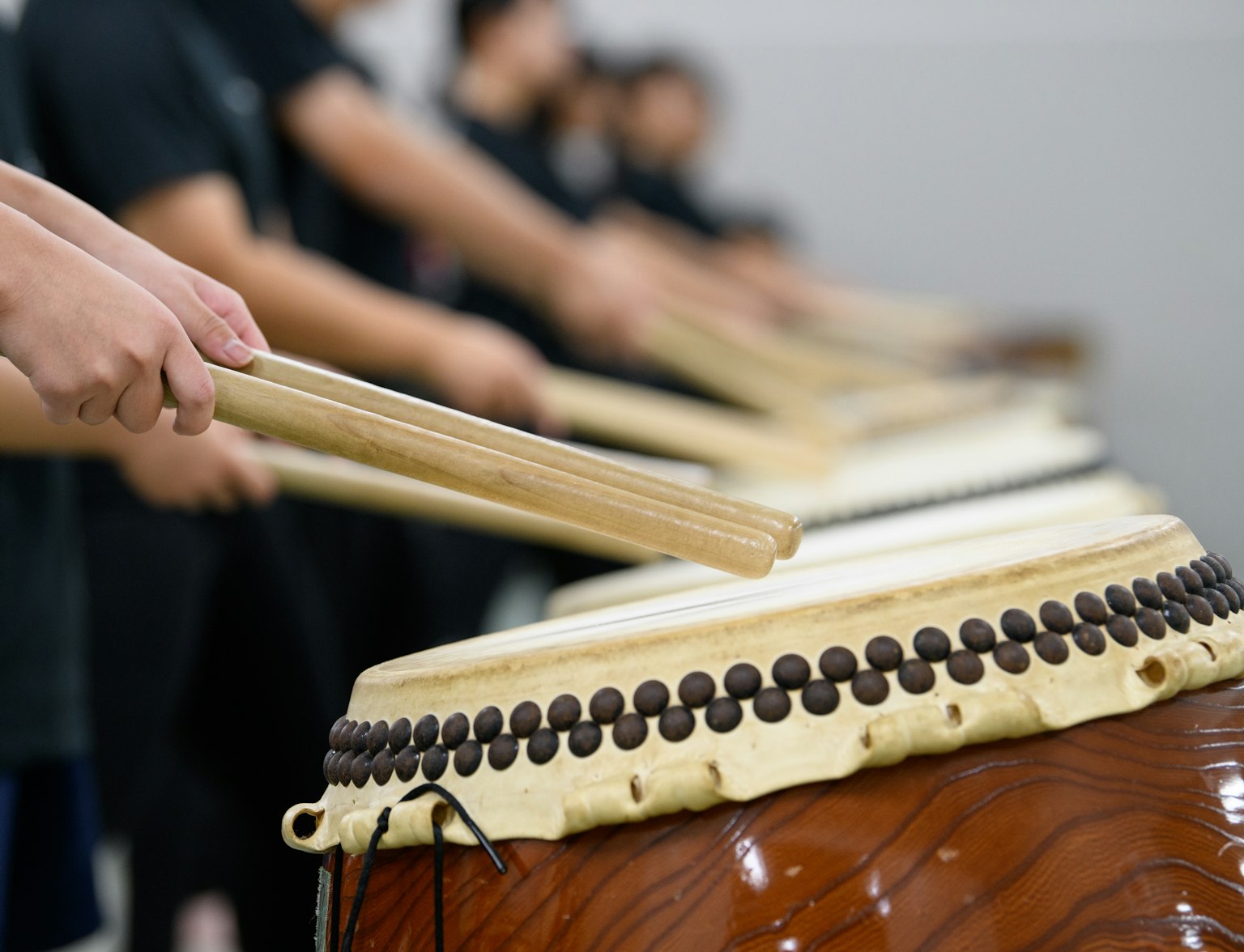
Experience the thrilling beats of traditional Japanese Wadaiko drumming in a beginner-friendly workshop.
The Drum Museum (Taiko-kan) Asakusa is a unique destination for anyone interested in music and Japanese culture. This interactive museum is dedicated to percussion instruments, particularly traditional Japanese drums. Visitors can learn about the history and cultural significance of taiko while exploring the diverse collection of drums from Japan and around the world.
What sets this museum apart is its hands-on experience. Visitors are encouraged to play the taiko drums, making it a fun and engaging activity for all ages. Whether you’re a musician or simply curious, the Drum Museum offers a rare opportunity to connect with the rhythm and sound of Japanese traditions.
Asakusa stands as a living reflection of Japan’s cultural roots, blending historic traditions with modern experiences. Every corner of this neighborhood, from its sacred temples to its artisan workshops, tells a story that resonates with the spirit of Tokyo’s past.
Whether it’s indulging in time-honored delicacies, crafting a piece of art, or simply strolling through its vibrant streets, Asakusa offers a journey that is both enriching and unforgettable. It’s a place where every experience feels meaningful, leaving you with a deeper connection to Japan’s heritage.



